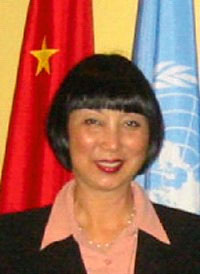|
Integrated TRADITIONAL Medicines OBJECTIVES | PROGRAMME | ORGANISERS | SPEAKERS | Announcement | THE VERBANIA DECLARATION PHOTO | MEDIA | SPONSORS & PATRONS | HOME | SEARCH | WORLD PEACE CONGRESS | SITE MAP
|
|
|
|
Lana Yang is a freelance business development consultant in the global pharmaceutical and biotechnology industry. Lana is trained in cell and molecular biology, clinical pharmacology, clinical research, new products development and marketing research. She is familiar with the biotechnology of monoclonal antibody, recombinant DNA, and the US FDA regulatory requirements of GLP, cGMP and GCP. She has been pivotally involved in all phases of clinical trials, three New Drug Applications, as well as market research, strategic planning, portfolio management and assessment of licensing opportunities in the pharmaceutical industry. Lana was born in China; she studied Chinese Literature and Fine Art in Taiwan before moving to the United States to continue her undergraduate and graduate education. She has a B.S. in biology and a M.S. in physiology and pharmacology from the School of Medicine, University of California in San Diego. She has trained with two Nobel Laureates in medicine, as well as several pioneer scientists in cell and molecular biology. Lana has completed the studies in Business Management at the Wharton School, University of Pennsylvania and follows the world economics closely. Lana lives in
Philadelphia, Pennsylvania, USA. She is a United Nations representative
for IAEWP, the International Association of Educators for World Peace. Her
email address is: LanaYang@comcast.net. Many herbal medicines have been successfully developed into ethical pharmaceuticals to benefit more people. Because patients are different in age, gender, genetic composition and health status, modern pharmaceuticals development are aimed at defining the nature of the drug, in order to develop proper dosing regimens to safely and efficaciously treat a broad range of patient population. Western pharmacology textbooks have commonly acknowledged that the first pharmacologist was the ancient Chinese Emperor Shen Nung of 3,500 B.C., who identified medicinal herbs by testing on himself before treating others. In 200 B.C., the Greek physician Hippocrates used the bark and leaves of willow trees to relieve pain and fever, later in 1897, the active ingredient was synthesized as a stable powder named aspirin by a German chemist working at Bayer. More recently, the active ingredient Taxol, developed from the bark of the Pacific yew trees, was tested and approved by the FDA in 1992 to treat breast cancer. In the later 19th century, entrepreneurial doctors had started several ethical pharmaceutical companies, to standardize traditional medicine to modern medicine in dosage forms. How do the ethical pharmaceutical companies develop drugs in the 21st century? Lana can discuss the roadmap of drug development in the USA. As required by the FDA for the protection of the patients, the current drug development process takes about 7 to 10 years, as much as 350 million US dollars. It consists of preclinical toxicity and pharmacokinetics testing in animals, and clinical trials in humans. The stages of clinical trials include Phase I clinical trials in healthy volunteers to define the nature of the medication (ADME = administration, distribution, metabolism, and excretion), phase II trials in a small group of patients to prove the concept of the medication and identify the right range of doses, phase III trials in a broader range of patient populations to confirm the safety and efficacy of the medication, and Phase IV trials of post-marketing surveillance to assure the proper protection of the general population of patients. Lana will also discuss the current trend in the pharmaceutical industry driven by marketing, the unmet needs in the healthcare, and the collaborations needed between the traditional medicine doctors and ethical pharmaceutical companies. |
|
|
|
